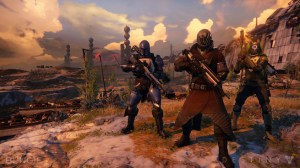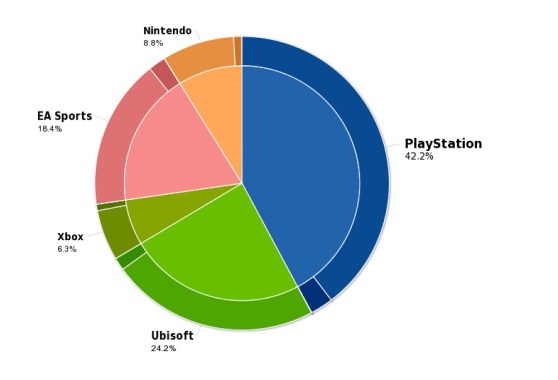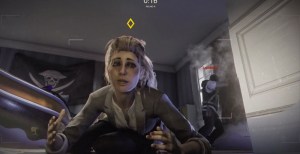The Electronic Entertainment Expo video game trade show is in its 20th year, and I’ve only missed a couple of the shows. During the past week, I thoroughly enjoyed seeing my annual close-up snapshot of the game industry. After walking approximately 20,000 steps a day for four days, these are the impressions that I’m leaving Los Angeles with. For some companies, these observations will be bitter medicine. Some may jump with joy. But I hope there are lessons for everybody here.
 My first impression is that the best game of the show was Evolve, the 4-versus-1 co-op game that pits a team of human hunters against a single creature, which another player controls. The game from developer Turtle Rock Studios and publisher Take Two Interactive’s 2K Games label had long lines, even though it was announced a while ago. Everyone I talked to about it liked it. My only disappointment here is that I saw this game weeks ago, so it didn’t come as a surprise at E3.
My first impression is that the best game of the show was Evolve, the 4-versus-1 co-op game that pits a team of human hunters against a single creature, which another player controls. The game from developer Turtle Rock Studios and publisher Take Two Interactive’s 2K Games label had long lines, even though it was announced a while ago. Everyone I talked to about it liked it. My only disappointment here is that I saw this game weeks ago, so it didn’t come as a surprise at E3.
Evolve is simple yet deep, and it leaves its combatants hollering after every round. I am confident that this game will win the top award of the show, even though it has no single-player version. I am worried that the team may not get the damage right, like when a monster takes a swing at a human, or a human pumps a monster full of lead. But I have no doubt that this game is going to be a hit when it debuts on Oct. 21. If it wins “game of the show,” it will be the second year for a multiplayer-only title, as Titanfall was last year’s winner.
 The most overhyped and underwhelming game of the show was Activision’s Destiny. I played this sci-fi shooter last week, and it just didn’t feel that epic or fun. The game looks beautiful, but doesn’t run at blazing speeds. As a single-player game, it’s not as fun as developer Bungie’s previous games, the Halo series. If you play with strangers, you can count on them abandoning you in your hour of need. And if you play with friends, you’re going to have to schedule an appointment with them.
The most overhyped and underwhelming game of the show was Activision’s Destiny. I played this sci-fi shooter last week, and it just didn’t feel that epic or fun. The game looks beautiful, but doesn’t run at blazing speeds. As a single-player game, it’s not as fun as developer Bungie’s previous games, the Halo series. If you play with strangers, you can count on them abandoning you in your hour of need. And if you play with friends, you’re going to have to schedule an appointment with them.
Bobby Kotick, the chief executive of Activision, has said that Destiny will be the company’s next billion-dollar franchise and that it may spend $500 million on the game series over the next decade. From what I’ve seen, it will be a disappointment. That’s a shame, as Bungie has more than 500 people working this game. Destiny needs a better story, stronger characters, speedy gameplay, and a little more humor. Maybe Activision and Bungie have that, but they didn’t show this.
As for the big platforms, I believe that Sony has an edge over Microsoft, though the differences between No. 1 and No. 2 will be quite small in this generation. Sony’s 14 game studios are churning out awesome-looking games like the next Uncharted and the new The Order: 1886, a steampunk shooter. But I’ve fretted that too many of these games are being delayed until 2015. Unruly, which analyzes social sharing, confirms my impression that Sony won. Microsoft needs to stop delaying games and ship something great.
I still worry about Nintendo, whose Wii U is still a burning platform. Reggie Fils-Aime, the president and chief operating officer of Nintendo of America, told me in an interview that the company recognizes that it has performed poorly over the last three years, and he says that it is working with a sense of urgency on delivering better games. He believes Nintendo isn’t arrogant and that it can learn from the success of rival mobile game makers. He said that the Wii U is selling four times better on a daily basis since the launch of Mario Kart 8. I saw some great games coming from Nintendo — like the multiplayer brawler Super Smash Bros. Wii U and the ink-splattered team shooter Splatoon. But it still seems like it is moving in slow motion and has yet to fully embrace change.
As far as platforms go, I believe that Oculus VR remains a wild card, as it showed off yet another series of cool demos for its Oculus Rift virtual reality headset. The best was a platform game demo from Paul Bettner’s new company, Playful Corp.
But it’s time for Oculus, which Facebook acquired for $2 billion, to start filling out the rest of its system and set a deadline for shipping. Brendan Iribe, chief executive of Oculus, agreed with me on those points. He says that day is coming.
While there were winners and losers at E3, no one should get cocky. Although the show was about the same size as last year with 48,000 attendees, it seemed like a shrinking industry, because of its focus on consoles over everything else.
I have to wonder if one of the biggest platforms coming for games wasn’t at the show. On June 18, Amazon is expected to launch its 3D smartphone, completing a full chain of hardware and software that could be a very important ecosystem for games. Amazon’s 3D device will be a phone first, but it means that the giant online retailer will now offer the following: a smartphone, a Kindle Fire tablet, and a Fire TV set-top box. All of these devices will be capable of running games. And Amazon has its own app store for games as well its game-streaming and -hosting services with Amazon Web Services.
Google and Apple are in a similar position. They could do wonders for gaming, if they only stopped being “accidental game platforms” and became deliberate, intentional ones.
It certainly seemed like the mobile game companies didn’t come to the show. It’s too bad that they didn’t see the value of renting a booth. By 2017, market researcher Newzoo thinks that mobile games will be a $35 billion industry, the largest segment of a $100 billion business.
In the meantime, the biggest party of the week was the Play Connected party in Hollywood, staged by PC game companies Nexon, Riot Games, Wargaming.net, and Valve. They have stolen the mantle for most crowded and outrageous party from Sony.
E3 may have made a lot of progress toward inclusiveness and diversity since its early days. But game companies can still be tone-deaf. I saw fewer “booth babes” at the show, and those that were present had more tasteful clothing.
But some of the game companies still didn’t have playable female characters. And Ubisoft in particular should know better. It introduced four new characters to star in its Assassin’s Creed: Unity game. All of the protagonists are male. That’s a missed opportunity for a game that was the most-shared title of E3, according to Unruly.
But Rainbow Six: Siege was worse. It pitted five soldiers against five terrorists in a hostage-rescue combat game. It was a really quite fun, particularly from an e-sports point of view, as one team tries to breach a house while another team tries to protect it and defend a hostage. The combat is merciless, as you can die from one shot.
The only problem was that the hostage was a meek young woman. She’s tied up, awaiting you to free her. You break into the home, locate her, shoot the terrorists, and then you escort her out. The problem is she is quite likely to get shot, or “stolen” back, from the rescuers. During an onstage demo, the woman got shot and she had to be “revived.” The team in possession of the hostage changed multiple times.
Ubisoft’s game designers really ought to replace the woman with something that really makes it clear what we’re fighting over here: a teddy bear. When you think of the woman as a teddy bear, I think you’ll see my point. She’s like a football in a football game, or a piece of property that the men are fighting over. At a time when some of the most compelling game characters are female (like Ellie in the Last of Us and Jodie in Beyond: Two Souls), Ubisoft took a step backward with this title.
I’ll close on some hopeful and positive notes. Sega surprised me with the quality of its old-fashioned sci-fi horror game, Alien: Isolation, which starred a young woman fleeing from an alien infestation on a space station. It brought back memories about what made those Alien movies so moving and scary.
And I really enjoyed Guns Up, a simple free-to-play war game for the PlayStation 4 from indie game developer Valkyrie Entertainment. And Ubisoft’s Valiant Hearts: The Great War could be quite moving and educational, so long as it doesn’t get too melodramatic.
VentureBeat's mission is to be a digital town square for technical decision-makers to gain knowledge about transformative enterprise technology and transact. Learn More




